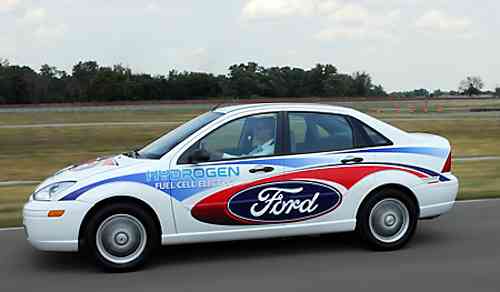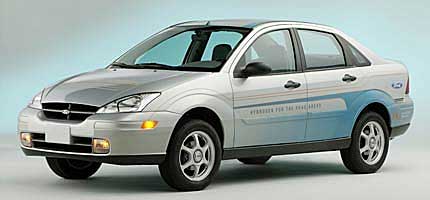The Ford Focus FCV (Fuel Cell Vehicle) is Ford’s most recent hydrogen car. This is where Ford believes the future lies for this beleaguered car company. On September 5, 2006 Bill Ford stepped down as the CEO of Ford Motor Company. Before stepping down, however, the great grandson of Henry Ford devoted much of his time, energy and resources to the new technology of hydrogen cars.
|
|
Ford has jumped into the hybrid market full force with its Escape Hybrid and Mercury Mariner Hybrid SUV’s. Take this technology one-step further into advanced fuel cell vehicles and this is where the Ford Focus FCV comes into play.
The Ford Focus FCV is where the future of the automobile industry is headed within the next 5 – 10 years. With President Bush’s State of the Union Address on January 30 calling once again for more federal money to be put into the advancement of hydrogen cars and vehicles, the idea that there will indeed be a hydrogen highway one day leaves no doubts.
The Ford Focus FCV is powered by a Ballard 902 Fuel Cell, Proton Exchange Membrane (PEM) stack. The car’s 5000 psi pressurized hydrogen tank releases H2 into the fuel cell stack where the hydrogen is temporarily separated into protons and electrons, producing electricity, then united with oxygen from the air to produce the vehicle’s only byproduct, water.
The Ford Focus FCV is called a Generation 3 hydrogen car since other research cars have come before it, namely the Ford P2000 fuel cell vehicle, which still holds the record of traveling nearly 1,400 miles in a 24-hour period. The Ford Focus FCV is powered by electric motor and receives its electricity from two sources. The first source is directly from the fuel cell and the second source is from the H2 car’s battery pack (a module containing High Voltage SANYO Ni-MH Battery System).

The Ford Focus FCV has a driving range of approximately 150 – 200 miles and a top speed of 80 mph. The Focus FCV’s powertrain produces 170 ft-lb. torque and 87 bhp.
Ford has been sharing technology between its Escape and Mariner Hybrid SUV’s and the Ford Focus. According to Mary Ann Wright, director of Sustainable Mobility Technologies and Hybrid Programs for Ford Motor Company, “The engineers who work on the Focus FCV work hand in hand with those developing our gasoline hybrids. The knowledge we gain by engineering these cars not only benefits our expertise in innovative fuel cell propulsion technology, it also will help us deliver even better gasoline hybrids in the near term.”
The Ford Focus FCV is a little different than other hybrid or bi-fuel vehicles. The Ford Focus FCV does not run directly on hydrogen like the BMW HR2 does, flipping between gasoline and hydrogen to power its internal combustion engine. The Ford Focus FCV shares some other hybrid technology such as regenerative braking, to recharge the Ni-MH Hybrid Battery System.
Ford has delivered 30 Focus FCV’s (evaluation fleets) to different cities in the United States, Canada and Germany. Five Ford Focus FCV’s have been delivered to California, Florida, Michigan and British Columbia. Ford has also committed to deliver 8 hydrogen-powered buses for use in Orlando, Florida and 2 H2 TUG M1 tow tractors for use at the Orlando International Airport.
Ford Focus FCV Specifications:
Specifications
|
Electric Motor/Transaxle (Integrated)
|
Written by Hydro Kevin Kantola
